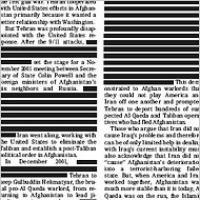BROOKE GLADSTONE:
As we've noted before on the show, even though the quarter million confidential State Department cables leaked last year by WikiLeaks have long been public, they are still officially confidential. Last spring, the American Civil Liberties Union filed under the Freedom of Information Act for copies of cables dealing with such issues as Guantanamo, Rendition and Torture. And the State Department responded by offering redacted documents, as if the truth were not, as it were, already out there.
It's a charade that the ACLU decided to highlight by making a little mischief. Ben Wizner is the litigation director for the ACLU's National Secrecy Project.
BEN WIZNER:
The idea was to force the government to go through the declassification process and to see which of many uncomfortable responses they would come up with. Would they release the documents in full, in accordance with common sense? Would they withhold them in full and look silly? Would they redact them and essentially give us a road map to what they think is important and sensitive information and what is not. And remarkably, they chose the third option.
BROOKE GLADSTONE:
[LAUGHS] The most revealing one.
BEN WIZNER:
[LAUGHS] In a sense it is, that's right. Twelve of the documents, they said, had to be withheld in full. Eleven, they gave us redacted versions. And so, we have a unique window into the government's classification process.
BROOKE GLADSTONE:
And just for people who haven't seen a redacted document, that's where chunks of it are blacked out. You can't see through it. It looks a little like Swiss cheese.
BEN WIZNER:
Well, that's right. And what we've gone at ACLU.org is put up the redacted documents. But when your cursor hovers over the redacted portion, the text magically appears. And so, we get to see what the government would prefer that the world not know.
So in a discussion with foreign governments, you might see unredacted all of the subjects of agreement, and then the censor's pen will come out when that government is criticizing US policy on rendition, on torture, on Guantanamo, or the like.
BROOKE GLADSTONE:
So what you've got is essentially a teachable moment and you give people who visit your site an opportunity to experience the childhood joys of invisible ink.
BEN WIZNER:
Well, it's that, and it's a little bit more. So though there is something cheeky about asking for something that we already have, we're hoping to illuminate what is a serious issue in the way that the government abuses its secrecy privilege.
The whole secrecy regime is really predicated on the asserted distinction between what is universally known and what's officially acknowledged. The fact that the whole world has access to these documents means nothing to the government and means nothing to a court, until the moment that the government acknowledges them, so that the government can, for example, off the record, brag to reporters about the wonderful successes of their targeted killing drone strike program, but when we file a request under FOIA to get documents about that they can refuse to confirm or deny the existence of that program.
When we file a lawsuit seeking to set legal limits on that program, they can invoke the state secrets privilege over information that is known but not confirmed. And so, the idea here is not just to have these documents, but to be able to use them.
And by putting the government through the exercise of declassification, our hope was to move this from being known to being acknowledged.
BROOKE GLADSTONE:
Ben, thank you very much.
BEN WIZNER:
Brooke, it's always a pleasure. Thank you so much.
BROOKE GLADSTONE:
Ben Wizner is the litigation director of the ACLU's National Security Project. We'll feature some before and after shots of those documents on our website, Onthemedia.org, and we'll also offer links to the ACLU's project.
